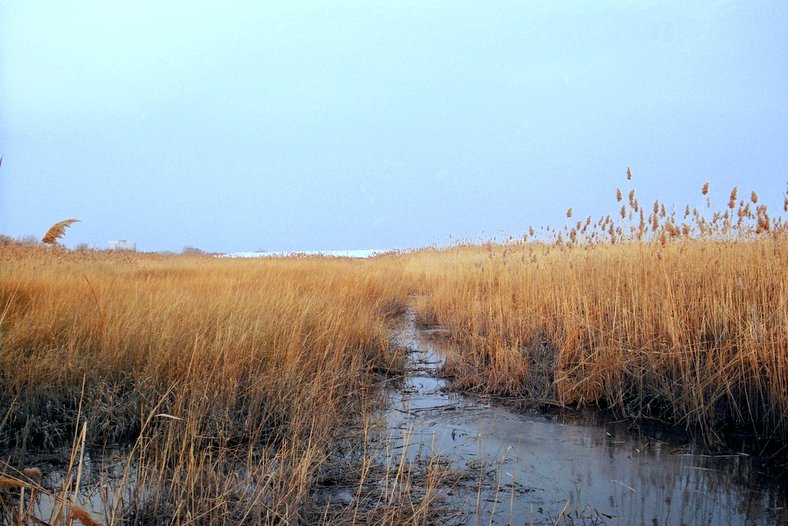Marsh
 In ecology, a marsh is a wetland that is dominated by herbaceous plants rather than by woody plants. More in general, the word can be used for any low-lying and seasonally waterlogged terrain. In Europe and in agricultural literature low-lying meadows that require draining and embanked polderlands are also referred to as marshes or marshland.
In ecology, a marsh is a wetland that is dominated by herbaceous plants rather than by woody plants. More in general, the word can be used for any low-lying and seasonally waterlogged terrain. In Europe and in agricultural literature low-lying meadows that require draining and embanked polderlands are also referred to as marshes or marshland.Marshes can often be found at the edges of lakes and streams, where they form a transition between the aquatic and terrestrial ecosystems. They are often dominated by grasses, rushes or reeds. If woody plants are present they tend to be low-growing shrubs, and the marsh is sometimes called a carr. This form of vegetation is what differentiates marshes from other types of wetland such as swamps, which are dominated by trees, and mires, which are wetlands that have accumulated deposits of acidic peat.
Marshes provide habitats for many kinds of invertebrates, fish, amphibians, waterfowl and aquatic mammals. This biological productivity means that marshes contain 0.1% of global sequestered terrestrial carbon. Moreover, they have an outsized influence on climate resilience of coastal areas and waterways, absorbing high tides and other water changes due to extreme weather. Though some marshes are expected to migrate upland, most natural marshlands will be threatened by sea level rise and associated erosion. Provided by Wikipedia
-
1001by Dixmer Rivera, Rashed Shah, Tanya Guenther, Meredith Adamo, Jeanne Koepsell, Carmen Maria Reyes, Mary McInerney, David R. MarshGet access
Published 2017
Article in Journal/Newspaper -
1002by Kager Piet, Berkley James A, Mturi Florence N, Talbert Alison W, Mwaniki Michael K, Marsh Kevin, Newton Charles RGet access
Published in Malaria Journal (2010)
Get access
Article in Journal/Newspaper -
1003
-
1004by Marsh, Robert, Bigg, Grant, Zhao, Yifan, Martin, Matthew J., Blundell, Jeffrey R., Josey, Simon A., Hanna, Edward, Ivchenko, VladimirGet access
Published in Natural Hazards (2017)
Get access
Article in Journal/Newspaper -
1005by Marsh, R., Bigg, G., Yifan, Z., Martin, M.J., Blundell, J.R., Josey, S.A., Hanna, Edward, Ivchenko, V.Get access
Published in Natural Hazards (2018)
Get access
Get access
Get access
Article in Journal/Newspaper -
1006by Marsh, Robert, Bigg, Grant, Zhao, Yifan, Martin, Matthew J., Blundell, Jeffrey R., Josey, Simon A., Hanna, Edward, Ivchenko, VladimirGet access
Published in Frontiers in Marine Science (2017)
Get access
Get access
Article in Journal/Newspaper -
1007by Marsh, R., Bigg, G., Zhao, Y., Martin, M.J., Blundell, J.R., Josey, S.A., Hanna, E., Ivchenko, V.Get access
Published 2018
Get access
Article in Journal/Newspaper -
1008
-
1009by Marsh, Robert, Bigg, Grant, Zhao, Yifan, Martin, Matthew J., Blundell, Jeffrey R, Josey, Simon A., Hanna, Edward, Ivchenko, VladimirGet access
Published in Natural Hazards (2017)
Get access
Article in Journal/Newspaper -
1010by Marsh, R., Smith, M. P. L. M., Rohling, E. J., Lunt, D. J., Lenton, T. M., Williamson, M. S., Yool, A.Get access
Published 2006
Get access
Get access
Article in Journal/Newspaper -
1011by Marsh, R., Smith, M. P. L. M., Rohling, E. J., Lunt, D. J., Lenton, T. M., Williamson, M. S., Yool, A.Get access
Published 2006
Get access
Get access
Article in Journal/Newspaper -
1012
-
1013by Youngbluth, Marsh J., Bailey, Thomas G., Davoll, Peter J., Jacoby, Charles A., Blades-Eckelbarger, Pamela I., Griswold, Carolyn A.Get access
Published in Deep Sea Research Part A. Oceanographic Research Papers (1989)
Get access
Get access
Article in Journal/Newspaper -
1014by Marsh, Jessica E., Lauridsen, Rasmus B., Gregory, Stephen D., Kratina, Pavel, Scott, Luke J., Cooling, Dave, Jones, John IwanGet access
Published in Ecological Applications (2021)
Get access
Get access
Get access
Article in Journal/Newspaper -
1015by Wilcox, Evan J., Keim, Dawn, de Jong, Tyler, Walker, Branden, Sonnentag, Oliver, Sniderhan, Anastasia E., Mann, Philip, Marsh, PhilipGet access
Published in Arctic Science (2019)
Get access
Get access
Article in Journal/Newspaper -
1016by Stemmann, Lars, Youngbluth, Marsh, Robert, Kevin, Hosia, Aino, Picheral, Marc, Paterson, Harriet, Ibanez, Frederic, Guidi, Lionel, Lombard, Fabien, Gorsky, GabrielGet access
Published in ICES Journal of Marine Science (2008)
Get access
Text -
1017by Stemmann, Lars, Youngbluth, Marsh, Robert, Kevin, Hosia, Aino, Picheral, Marc, Paterson, Harriet, Ibanez, Frederic, Guidi, Lionel, Lombard, Fabien, Gorsky, GabrielGet access
Published in ICES Journal of Marine Science (2008)
Get access
Text -
1018by Stemmann, Lars, Youngbluth, Marsh, Robert, Kevin, Hosia, Aino, Picheral, Marc, Paterson, Harriet, Ibanez, Frederic, Guidi, Lionel, Lombard, Fabien, Gorsky, GabrielGet access
Published in ICES Journal of Marine Science (2008)
Get access
Article in Journal/Newspaper -
1019by Stemmann, Lars, Youngbluth, Marsh, Robert, Kevin, Hosia, Aino, Picheral, Marc, Paterson, Harriet, Ibanez, Frederic, Guidi, Lionel, Lombard, Fabien, Gorsky, GabrielGet access
Published 2008
Other/Unknown Material -
1020